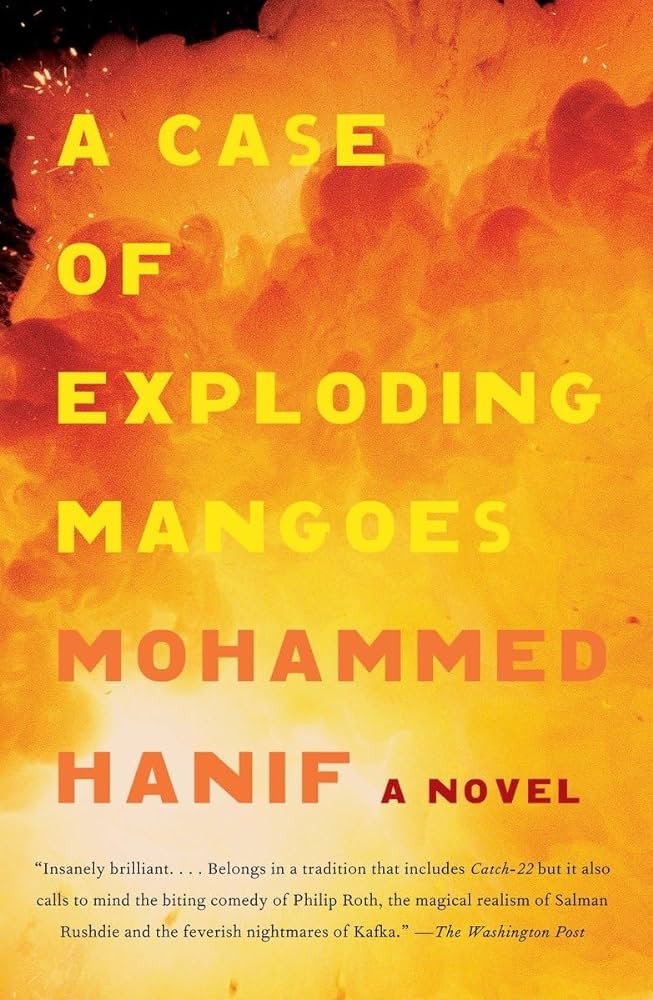
Illustration by Zeyd Anwar; Wikipedia
Positioned from the perspective of a renowned but deceased Colonel’s son, A Case of Exploding Mangoes (‘ACEM’) takes aim and scores brilliantly on the bullseye of its depiction of the civilian-army dichotomy that pervades Pakistan’s culture and political history. Far from being a mainstream or universally understood characteristic of Pakistan’s inception and society, Hanif ambitiously touches on the invisible divide two camps of Pakistanis and their nuanced dynamic. This is easily the most difficult yet successful part of the book that communicates clearly to the reader, demystifying the entity that is the “Pakistani Army’ by revealing their indigestible hypocrisies while humanising them in unexpected ways.
Hanif runs two parallel plot lines throughout the book, nearing their intersection just before the end. One is from the perspective of Ali Shigri, navigating the experience and duties in the Army after the suspicious death of his late father, found hanging from his ceiling fan. For from a revenge-fiction trope, Hanif carefully unpacks their complicated father-son relationship as Ali processes his loss and evaluates his father’s moral character. Troubled with his own identity crisis not too typical of a son born into a high-profile army family, here, Hanif projects his own experience as a pilot later turned journalist and creates a compelling, mysterious and down right hilarious fictional account of the events that led to General Zia’s notorious death. His literary craft is displayed through his arsenal of literary metaphors, imagery and hard-hitting prose and makes readers wonder and bless the gods for his late career change. But most of all, and with delicious irony, Hanif digs into and lays raw for exhibition the premium that society attaches to the part-virtue and part-curse of being ‘from a good family’.
In alternating chapters, life is seen through the eyes of the military leader and commander Zia-ul-Haq. Arguably more comical, Hanif’s depiction of Zia’s personality and character shortfalls — along with his paranoid style of governance — intentionally undermines the legitimacy of his legacy and attempts to revive the Islamic republic. Contradiction and hyperbole litters the pages to mock Zia’s irrationality and haphazard system of decision-making and philosophy, but as Hanif writes, “like all men of principle, General Zia was always ready to make an exception for a higher cause. And if the cause was a fundraiser for Afghan jihad, then no principle was sacred enough.”
Hanif also takes a jab at Zia’s practice of opening the Qur’an arbitrarily on any given moment, at any time of day, to inform his next strategic move, despite being entirely vacuous of context or knowledge of Islamic jurisprudence. Readers are left with little sympathy for Zia (perhaps only for his manifest foolishness and ability to be manipulated by his shrewd and calculated counterparts), and instead a sense of visceral shock at the layers of mistrust, deception and disconnect with the public endemic to their military government. Yet for all the militarisation and pretentious religious superiority, Zia only ever wanted to be perceived as a legitimately election civilian, — “not imposing but authoritative, not a military ruler but a president…”.
Ultimately, reading ACEM in 2020 gives small culture shocks at the hospitality and business-as-usual relationships between the Pakistani army, the U.S. and Afghanistan’s Mujahedeen. But the flair for humour and gradually increasing intensity till the climactic end ranks it an instant South-Asian classic and a fascinating read that delivers in more ways than one.
“And the eight men, despite their different levels of affiliation to religion, diverse tastes in whisky and women, and various English accents, reached the same conclusion.”
“Security wasn’t just about throwing yourself in front of an assassin’s bullet or pulling out the fingernails of a potential conspirator; it was more about anticipating the subtle shifts in everyday life patterns.”
“The starch of our uniforms stuck to our bodies like rough glue, sweat ran like lizards crawling over our flesh.”
“Our questions collide in mid-air and the answer lies wriggling on the jeep floor like an insect trying to take off after breaking a wing.”
“General Akhtar… was starving, and when he looked around the frozen landscape, all he saw was General Zia – fattened, chubby-cheeked and marinating in his own paranoia.”


